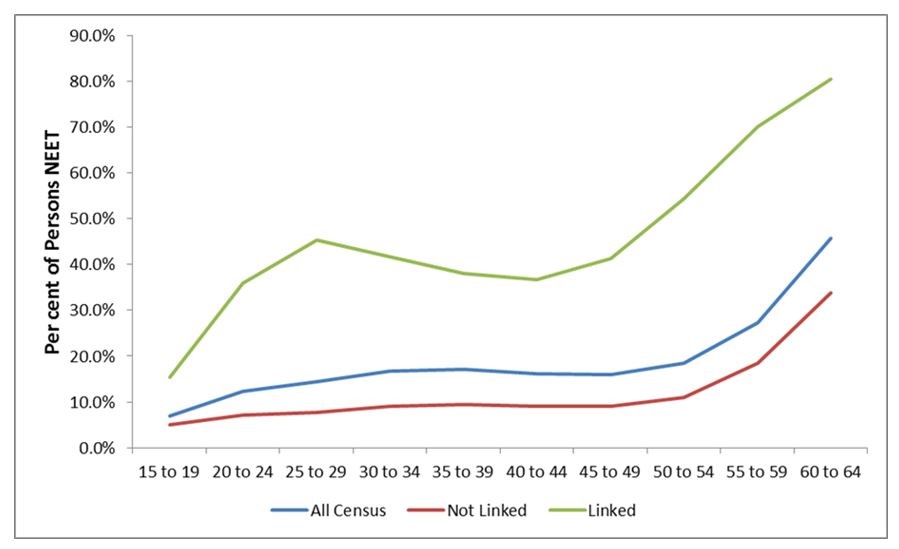Investigators: Francis Mitrou, Stephen Zubrick
Plain language summary
Australian adults who are Not in Employment, Education or Training (NEET) represent a significant proportion of income support recipients, yet little is known about them. The Department of Social Services and Australian Bureau of Statistics have linked Social Security and Related Information data to Australian Census of Population and Housing data to support informed policy-making around service populations for whom greater policy knowledge is required. LCC have been engaged to test the viability and value of these data to answer key policy questions as part of a proof-of-concept project, beginning with an analysis of income support recipients who are NEET.
Project description
The ongoing LCC Data for Policy initiative brings together multiple Commonwealth Government agencies to explore ways of realising the potential of Commonwealth administrative data.
One innovative project to flow from this initiative is NEET in Australia: Characteristics of Social Security Payment Recipients who are Not in Employment, Education or Training (NEET). The NEET project is a collaboration between LCC, the Australian Government Department of Social Services (DSS) and the Australian Bureau of Statistics (ABS). It uses DSS Social Security and Related Information linked with ABS Census data for the first time in Australian social research, and utilises stringent privacy control measures.
The Life Course Centre was engaged to test the viability and value of these data to answer key policy questions, beginning with an analysis of income support recipients who are NEET. We examined individuals aged 15-64 years using SSRI data from September 2011 linked with Census data from August 2011. NEET status was analysed in relation to Census socio-demographic characteristics and SSRI income support payment type. Some 1.4 million or 47% of linked individuals qualified as NEET. Of NEETs, more than twice as many were female; nearly half were aged 45-64 years, and; NEETs were more likely to receive Carer Payment, Newstart Allowance, and Disability Support Pension. We found substantial differences in the socio-demographic and payment-type profiles of income-support recipients by NEET status.
This project is also the first of its kind to look at the NEET cohort as a working age phenomenon covering ages 15-64 years. Previous work has concentrated on young people aged 15–29 years, as per OECD standards, with Australian policy discussions focussing on this younger group. LCC’s analysis highlights a need to widen this age focus to encompass all working ages up to age-pension eligibility. Young NEETs, mid-life NEETs, and older NEETs are all policy relevant for different reasons.
The results are important for understanding who misses out on education and employment opportunities in Australia and how current welfare options are implicated in these processes. Further research seeks to inform policy around longitudinal pathways into and out of NEET status.
Proportion of DSS payment recipients classified as NEET, by age group

Research Note: Maintaining the privacy of individuals is a key priority in administrative data projects. As such, analysis is conducted using only de-identified information accessed inside a secure environment by authorised personnel.
Funders of the project
ARC Centre of Excellence for Children and Families over the Life Course
External collaborators
Australian Government Department of Social Services
Australian Bureau of Statistics
The University of Queensland Node of the Life Course Centre
